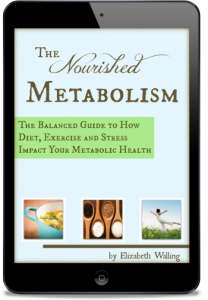Metabolism is probably the most poorly-understood aspect of health there is. From both the so-called experts in nutrition and medicine, to the perceptions about it by the general public, everyone is pretty confused about what metabolism means, and what influences it.
We tend to think metabolism is a part of our genetics—you’re either a skinny-mini lucky enough to be able to eat whatever you want because you were born with a “fast” metabolism, or you’re one of the poor souls doomed to a life of skipping breakfast and turning down the dessert menu all because your “slow” metabolism will make that muffin go straight to your, well, muffin top.
But is that really true? Are you stuck with whatever sort of a metabolism you’ve got?
And what are we really talking about here, anyway? What do they mean when they say “slow” or “fast” metabolism? Magazine articles and Facebook memes make it sound like the secret to speeding up your metabolism is a carefully-crafted arrangement of superfood supplements, eating nothing but kale and quinoa, and guzzling gallons of pure water day in and day out.
You might want to think twice before you listen to those.
What Metabolism Really Is and Is Not
I learned about a year and a half ago that metabolism isn’t at all what I thought it was. For one thing, I though for sure I had a super-speedy, crazy-high metabolism. Why else was I so thin to the point of being underweight, despite eating whatever I wanted?
Well, I was wrong.
I actually had very poor metabolic health at the time. Because metabolism doesn’t mean whether or not you can eat food without gaining weight, it’s not a matter of simply burning calories, and it’s not how much exercise you need to do.
The truth is that the body’s metabolism means much, much more than that—it’s actually the foundation of every aspect of your health.
And I don’t mean that to be taken lightly. Literally all systems of the body are affected by metabolism. Why?
Because metabolism is the rate at which your cells produce energy. So think about that—it means how good they are at taking in fuel, and producing energy—which is what every part of your body needs to function. In every single one of your cells.
Yeah, it’s a big deal.
How do you know if yours is stressed?
Suffering from a low, slow, stressed metabolism is way more common than you might think. Since the metabolic rate affects all systems of the body, a wide range of symptoms can be experienced as a result of a stressed metabolism. And with a healthy, nourished metabolism, quite the opposite physical effects are seen.
Which side of this chart describes you the best?
 from The Nourished Metabolism, by Elizabeth Walling
from The Nourished Metabolism, by Elizabeth Walling
Is your metabolism more stressed than it is nourished?
If that’s the case for you, I highly recommend reading the new ebook, The Nourished Metabolism, by Elizabeth Walling. The Nourished Metabolism is the most simple, straightforward guide to achieving metabolic health that I have come across yet.
 If you just want to know why you have these symptoms you can’t seem to shake, and what to do to start feeling better fast, without having to make drastic or difficult changes in your diet or day-to-day life, this is what you need. You’ll learn everything from how to improve your digestion, to how to start sleeping better tonight, and all the steps you need to get your metabolism up to speed and be healthier than ever before.
If you just want to know why you have these symptoms you can’t seem to shake, and what to do to start feeling better fast, without having to make drastic or difficult changes in your diet or day-to-day life, this is what you need. You’ll learn everything from how to improve your digestion, to how to start sleeping better tonight, and all the steps you need to get your metabolism up to speed and be healthier than ever before.
Everything you need to know to get on the right metabolic track is included in this book. And you won’t believe how simple and effective some of these changes can be!
Here’s what I think are the top three takeaways and secrets to nourishing your metabolism from reading the book, myself.
Nourished Metabolism Secret #1: Ditch the Diets and Stick to Balanced Eating Principles
Diets don’t work.
Really. Wanna know what the single greatest predictor of weight gain is? DIETING.
The reason for this comes down to the simple fact that restrictive dieting of any kind is very damaging to the metabolism, causing your body to resist weight loss in the future and become more prone to gaining weight as a measure of protection. How does this happen?
Q: Why is your body storing more fat weight than it needs?
A: Your body thinks you really do need that fat to survive.
Q: Why would your body think it needs that much extra fat?
A: Because it’s preparing for the next famine.
Q: What famine? If there’s food everywhere I turn, where’s this “famine” coming from?
A: From you. You’re telling your body there’s a famine every time you go on a diet and deny your body the nourishment it needs from a balanced diet of nutritious food.
from The Nourished Metabolism, by Elizabeth Walling
And if you think it doesn’t count as “dieting” if you’re simply limiting the amount of fat or carbs in your diet, while still eating plenty of food, think again.
If you want to stress out your metabolism, start denying it some of the most basic elements it needs to survive. This simple act of deprivation is enough to trigger the release of stress hormones (and all the accompanying side effects). Why? Because the body uses the stress hormones adrenaline and cortisol to access alternate sources of energy (i.e. get sugar from protein or ketones from fat).
In the beginning, these deprivation diets can produce weight loss and even some positive side effects that make it appear as if they’re helping. But that’s just the initial surge of adrenaline and cortisol talking.
from The Nourished Metabolism, by Elizabeth Walling
If you want to make a change in your diet that actually will support a healthy metabolism and weight, it’s pretty simple. Eat a balanced diet!
If you want an eating plan for life, forget fad diets that restrict macronutrients. Instead, eat balanced! The basic structure you want in a diet is a balance of carbohydrates, proteins and fats. You want some of each every day, preferably some of each at every meal and snack. These macronutrients compliment each other, aiding in the optimal absorption and utilization of each. Fats, carbs and protein work together to promote a nourished metabolism.”
from The Nourished Metabolism, by Elizabeth Walling
You need all of the basic macronutrients, and you also need a balance between both nutrient-dense foods and energy-dense foods. This was something I was so pleased to see Elizabeth address in the book.
Your body needs a careful balance of energy versus nutrients. Too much energy without enough nutrients, and you wind up with problems connected to nutrient deficiencies. Plenty of nutrients without enough energy leads to a slow metabolism and its associated side effects.
What this means is that while eating nutrient-dense foods is important, not everything you eat has to be packed with vitamins and minerals. Eating enough foods which provide adequate energy is important as well. Again, it’s all about balance.
For instance, white rice is a relatively neutral food. It’s a great source of easily digested energy, but it also contain virtually no vitamins and minerals. However, eat it as a side to a hearty stew made with grass-fed beef and real broth, and suddenly you’ve got a meal that supplies you with energy and nutrients.
from The Nourished Metabolism, by Elizabeth Walling
Nourished Metabolism Secret #2: Get The Right Amount of Rest, AND Activity
Everyone knows getting enough sleep is important. But did you know that sleep deprivation sends stress hormones climbing, and causes your metabolism to drop significantly?
Lack of sleep is a direct stress on the body. Sleep studies show that even one night of poor sleep can elevate your cortisol levels the next day. Imagine what happens when you sleep poorly almost every night! It’s a recipe for chronically high stress hormones.
from The Nourished Metabolism, by Elizabeth Walling
That’s not all. Sleep deprivation has also been shown to interfere with insulin sensitivity, increase your risk of stroke and diabetes, and contribute to poor brain function, increased anxiety, mood instability, and depression. You truly do need to make it a top priority for your health, and The Nourished Metabolism shows you exactly how to do that, with plenty of tips and tricks to get yourself in a solid bedtime routine that will support optimal metabolic health. My favorite trick? The metabolism-boosting bedtime snack! A balanced snack is key to keeping your blood sugar levels from plummeting, and your stress hormones from spiking, in the middle of the night, disturbing your much-needed sleep.
Just as important to resting your body with plenty of restorative sleep, is keeping your body active and moving during the day. If you’ve been living a more sedentary lifestyle, you may need to start slow with this. And we’re not talking signing yourself up for daily 5-mile runs or hours at the gym. Something as simple as taking a leisurely 5-minute walk, or just spending more time each day standing instead of sitting, can help to make big improvements.
Research indicates that time spent sitting down (such as at the computer, in front of the TV, or in the car) directly correlates with reduced longevity, poor insulin sensitivity, heart disease and more. Those who spend more time sitting down versus being up and about are more likely to experience health problems and possibly an earlier death. This is independent of exercise habits–meaning those who sit the most have the most health issues, even if they “exercise” regularly.
On the flip side, though, if you’ve been a chronic over-exerciser, you may need to tone down the excessive workouts ASAP.
Long sessions of endurance exercise (also known as cardio or aerobic exercise) requires the body to switch fuel sources so it can burn protein and fat for energy. This causes the release of stress hormones like cortisol and adrenaline.
When you’re doing endurance exercise on a regular basis (especially when you’re not eating and sleeping enough to support the activity), this leads to chronically high stress hormone levels.”
from The Nourished Metabolism, by Elizabeth Walling
What kind of exercise is best? The kind you most enjoy! And to keep it metabolically-supportive, it needs to be balanced between the amount of rest you’re getting (sleep and relaxation), the energy you’re taking in (the food you eat), the type of activity (don’t forget strength training—building muscles is key to supporting metabolism!) and how much activity your body can support in a healthy way (dependent on your current metabolic health.)
The Nourished Metabolism clearly lays out exactly what you need to know to incorporate more activity in a healthy way—plus how to exercise smarter, not harder—and reap the metabolic benefits.
Nourished Metabolism Secret #3: Bust the Stress from All Sources
Stress, of course, contributes to a stressed metabolism, which is a serious problem for your health.
What is stress, exactly?
Stress is often mislabeled and misunderstood. Most people think of stress as being “stressed out” emotionally, but stress can be caused by a variety of events–many of which aren’t emotional at all! There are a lot of misconceptions about what stress really is and how it impacts our health. But understanding stress and how it affects your metabolism is one of the most important things you can do for your health.
…Physiologically, stress could be considered any event that triggers a marked response by the adrenal glands. In basic terms, this response is the release of the stress hormones like adrenaline and cortisol. It’s the body’s natural reaction to any stressor.”
from The Nourished Metabolism, by Elizabeth Walling
Stress is the ultimate metabolism killer. And it can be brought on by a number of things—especially a restrictive diet, a lack of sleep, and an unbalanced level of physical activity. But there are other sources of stress you might not have considered—I know I hadn’t thought of these things as being damaging to the metabolism before reading the book! Things like:
- Allergies: From both food and environment, allergies trigger a stress response in the body.
- Physical stressors: Trauma from injuries, recovering from surgery, or even dealing with frequent cold viruses can be very stressful.
- Toxin exposure: In our food, water, and everyday environment in and outside of our homes, damage from toxins is a real concern.
- Not enough sunlight: Simply spending too much time indoors can be a stress on the body, which craves stimulating natural sunlight.
All these stressors add up, and can take a serious toll on your body.
Stress hormones break down proteins from your muscles and bones, and over time your lean body tissues deteriorate. They also deny energy to lesser systems in the body–the kind that aren’t important when you’re trying to outrun a lion–like digestion and mood health. That’s why poor digestion and low moods are some of the earliest symptoms of chronically high stress hormones. …As time passes, chronically high stress hormones contribute to further degeneration. This is when the risk for serious problems like cancer, heart disease and dementia increases.”
Addressing sources of chronic physiological stress is extremely important. Because stress is the biggest contributor to poor metabolic health, and all of the body’s systems depend on the metabolism, stress is essentially the root of all health problems.
My Story from Stressed to Nourished Metabolic Health
Like I mentioned before, I’ve struggled with a stressed metabolism myself. Thankfully, I started to significantly heal a little over a year ago with my efforts to fix my metabolic health.
I didn’t have The Nourished Metabolism back then to guide me, but after reading it, I realized that I did follow almost all the principles Elizabeth presents in the book. Specifically, I stopped being so obsessive over what I ate. I ended a restrictive diet. I made sure I was getting key nutrients that were missing in my diet before. I prioritized sleep. When I felt ready for it, I added in more physical activity to my otherwise sedentary lifestyle. I did everything I could to reduce stress from all sides—emotional, environmental, physical, and physiological stressors that I didn’t even know my body was dealing with.
The results? I’m a completely different person, in better health than ever before.
My hair is at least 50% thicker than it used to be. It also went from mostly straight, to curly, oddly enough, but I’m cool with that! My skin looks healthy without makeup on, and isn’t dry or oily anymore. My hands and feet aren’t cold anymore, and I can go about my day without wearing wool socks around the house.
My moods are more stable than they ever have been in my life—I used to have a pretty short fuse and now I can just roll with the punches. (Or more accurately, laugh at the trolls on my Facebook page instead of getting pissed off by them.) I have energy to to do things like going on bike rides and playing with my nieces, instead of just wanting to go back to bed. I never get PMS and my periods are a total breeze—sometimes I actually look forward to them, as weird as that sounds!
My weight normalized. Although my situation may seem a little different than most, since I was underweight, the underlying problem is the same between what my body was going through, and what someone who struggles at the opposite end of the scale does. It’s all about the metabolism. But settling into a healthy weight is merely a symptom of getting in better health, down to the cellular level. Healthy bodies naturally find a healthy weight.
Learn All the Secrets to a Nourished Metabolism—and save 98%!
If you’re tired of dealing with all the symptoms of a stressed metabolism—your cold hands and feet, mood swings, exhaustion and fatigue, insomnia, and more—now’s the time to fix them!
The Nourished Metabolism is on sale right now as part of the Fall into Health Autumn Sale package, for 98% off!
The Fall into Health Sale includes…
- 47 e-books – $955 value
- 15 exclusive podcast seminars – $45 value
- 3 online video classes – $238 value
- 2 meal plan packages – $223 value
- 2 magazine subscriptions – $63 value
- 21 coupons (for your favorite online healthy living retailers) – Over $500 value
And of course, The Nourished Metabolism is included, too!
You get over $2,000 worth of incredible real food and healthy living resources for only $39—that’s 98% off!
Like Elizabeth says, “Metabolic function is at the center of health, but if you don’t nourish your metabolism with the right diet and lifestyle habits, you’re missing out on what good health can bring to your life.” You don’t want to waste another day of living with a stressed metabolism, especially since you can start feeling better today with the simple solutions found in this book.
Click here to get your copy with the Fall into Health Sale now.
Hurry! Sale ends November 7th. Don’t wait to order before it’s too late!








Hi there! I am just wondering what the difference between this book and Matt Stone’s stuff is? Like if I already have Diet Recovery II, is this information new? Especially since even at the sale price, it costs twice as much?
Thanks!
Good question, Rachel. It is a different approach than Matt’s. I would say the biggest difference is that Diet Recovery is geared specifically toward those who have desperately tried diet after diet and experienced the damaging effects of yo-yo dieting and weight gain/loss, and so Matt’s approach is to go to the opposite extreme—temporarily adopting a complete disregard for eating “right,” and just focusing on getting healthy again. Which is a fine approach.
Elizabeth’s is more balanced. It not only addresses dieting and exercise, but also everything else that can be affecting your metabolism—sleep, allergies, environmental triggers, digestive issues, and more. There is much more of a focus on balancing both metabolism-boosting energy-dense foods as well as nutrient-dense foods, and it’s more of a holistic take on the subject overall. It’s also much more simple and straightforward than Diet Recovery. Don’t get me wrong, Diet Recovery (Diet Recovery 2 in particular) is an incredible resource and it’s a great read (with Matt’s sense of humor, it is more entertaining than Elizabeth’s, too), but it does take a little more effort to sort through the information, I think. The Nourished Metabolism lays out everything in a very easy-to-digest format.
I highly recommend reading both, as well as Matt’s Eat for Heat. They all have very important information that is not available in the others.
Also keep in mind, you’re getting two books with Elizabeth’s deal—both The Nourished Metabolism and Emotional Eating Myths & Solutions.
That’s a great response! Thank you. It definitely claryfies that for me. I could tell the focus was a bit more on the holistic, life-long side rather than the “recovery” aspect that Matt’s book is. So, after I’m done DRII, I think I’ll read this. Thanks again!
This article is so informative.Good to read article abut stress management.Keep it up and I hope to read more of your post soon.
Have you read the book body by science it is a very scientific book with all the literature to back it up, and it an “unconventional” approach to exercise called HIT about once a week. I definitely recommend it.